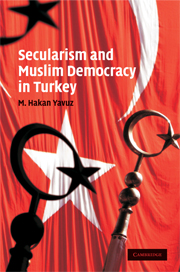Book contents
- Frontmatter
- Contents
- Preface
- Abbreviations
- Map of Turkey
- Introduction: what is an Islamic party? Is the AKP an Islamic party?
- 1 Historical and ideological background
- 2 Political and economic origins of the AKP: opportunity spaces and the backlash of February 28, 1997
- 3 Ideology, leadership and organization
- 4 Kabadayı and mağdur: Erdoğan and Gül
- 5 Modes of secularism
- 6 The Kurdish question and the AKP
- 7 The foreign policy of the AKP
- 8 The political crisis and the 2007 elections
- Conclusion: the end of dual sovereignty and the creole political language
- Bibliography
- Index
- CAMBRIDGE MIDDLE EAST STUDIES 28
Conclusion: the end of dual sovereignty and the creole political language
Published online by Cambridge University Press: 05 June 2012
- Frontmatter
- Contents
- Preface
- Abbreviations
- Map of Turkey
- Introduction: what is an Islamic party? Is the AKP an Islamic party?
- 1 Historical and ideological background
- 2 Political and economic origins of the AKP: opportunity spaces and the backlash of February 28, 1997
- 3 Ideology, leadership and organization
- 4 Kabadayı and mağdur: Erdoğan and Gül
- 5 Modes of secularism
- 6 The Kurdish question and the AKP
- 7 The foreign policy of the AKP
- 8 The political crisis and the 2007 elections
- Conclusion: the end of dual sovereignty and the creole political language
- Bibliography
- Index
- CAMBRIDGE MIDDLE EAST STUDIES 28
Summary
The silent revolution of Turkey contains two fundamental changes. The AKP's second term electoral victory and the election of Abdullah Gül as the president of the Republic represent the end of dual sovereignty or “parallel governments” in Turkey because the power of the military has been reduced. In addition, there is the evolution of a new moral language of politics that is very much shaped by the global discourses of human rights. The meanings of state, national identity, secularism and political community are redefined as a result of four interrelated transformations. These transformations are economic (introduction of market conditions), ideological (Islamic values and ideas are contemporarized), social (urbanization, spread of higher education and higher degree of social mobility) and political (democratization of the state and thickening of civil society), and they account for this revolutionary change. The neo-liberal economic reforms of Turgut Özal and the EU-led political reforms entailed an ideological transformation, especially the reinterpretation of Islamic ideas and norms in accordance with the needs of the new bourgeoisie. The economic transformation affects all sectors of society, especially conservative and peripheral Islamic groups with values and norms different from those of the modern (secular) sector of society and the Kemalist establishment. Turkey has been experiencing a dual and simultaneous process of integration and polarization. While the distance between the city and countryside, on one hand, and the state and a large sector of the conservative masses, on the other hand, is reduced with the democratic process, the most secular sector of society and the politicized Kurdish community feels alienated from the state.
- Type
- Chapter
- Information
- Secularism and Muslim Democracy in Turkey , pp. 267 - 281Publisher: Cambridge University PressPrint publication year: 2009



